Multiple Choice
Identify the
choice that best completes the statement or answers the question.
|
|
|
FAILURES OF THE WORLD WAR 1
PEACE SETTLEMENT
The
Treaty of Versailles that ended
World War I did not create a "just and secure peace." Germans saw nothing fair in a treaty
that blamed them for starting the war. Nor did they find much security in a settlement that stripped
their country of territories they had long seen as German. Similarly, the Soviets resented the
carving away of parts of Russia to create an independent Poland and the nations of Finland, Estonia,
Lithuania, and Latvia.
In addition, the peace settlement did not make the world "safe for
democracy," as Wilson had hoped. At the end of the war, new democratic governments did emerge in
many European nations, including Germany Austria, Italy, Czechoslovakia, Bulgaria, Romania, and
Greece . Most of these nations lacked democratic traditions, though, and their newly elected leaders
needed to made democracy succeed. However, the Versailles treaty did nothing to help the war torn
nations of Europe rebuild. Instead, many of the new democracies were expected to pay off huge war
debts while trying to deal with widespread hunger, homelessness, and unemployment.
Unable to
cope with these problems, several new democracies collapsed and dictators seized power. Some of these
dictators were content simply to collect taxes and keep order. A few, however, had far grander
ambitions
|
|
|
1.
|
The treaty that ended World War
I was called the Treaty of
a. | Paris | c. | Versailles | b. | World War I | d. | London |
|
|
|
2.
|
_____ resented the fact that
territory was taken away from them to create new countries after WWI.
a. | England and
France | c. | Poland and
Russia | b. | Russia and France | d. | Germany and Russia |
|
|
|
3.
|
Woodrw Wilson believed that WWI
would make the world safe for democracy. Why did democracy fail in Europe after
WWI?
a. | No new democracies were created
after the war | c. | The United States
was the only experienced democracy that fought in World War I | b. | Few of the new democracies had experience running their
countries as democracies | d. | Fascism is a better form of
government than democracy |
|
|
|
4.
|
Which statement is true about
the treaty of Versailles
a. | It put unfair burdens on Germany and
helped created an atmosphere where democracy could not succeed. | c. | It put unfair burdens on Poland and helped created an
atmosphere where democracy could not succeed. | b. | It was unfair to England and
France | d. | It treated all nations the
same. |
|
|
|
JOSEPH STALIN TRANSFORMS THE
SOVIET UNION
In Russia, hopes for democracy gave
way to civil war, resulting in the establishment of a Communist state, the Soviet Union, in 1922.
When V I. Lenin, the first
leader of the Soviet Union, died in 1924, Joseph Stalin took control of the country. Stalin,
took his name because it meant "man of steel," He was as iron-willed as his name
implied. Stalin focused on creating a model Communist state in the Soviet Union. In doing
so, he began an agricultural and industrial restructuring that trampled the rights of-and brought
great suffering to-his people.
In 1927, Stalin launched his massive drive to transform the
Soviet Union into a truly socialist country, which meant stamping out private enterprise, especially
private farming. He began by ordering the collectivization of Soviet agriculture-that is, the
organization of production under collective, or state, control . He forced Russia's peasants to
give up their small plots of land so that they could be combined into large state-owned farms . They
were then expected to work on the collective farms as wage earners .
Meanwhile, Stalin turned
to his second great goal, the transformation of the Soviet Union from a backward rural nation into a
great industrial power. By 1939, the Soviet Union had become the world's third largest
industrial power, surpassed in overall production by only the United States and
Germany.
The human costs of
this transformation, however, were enormous. To accomplish his ambitious goals, the "man of
steel" turned the Soviet Union into a vast police state-a state in which no one was safe from
the prying eyes and ears of government spies and secret police . Anyone even suspected of criticizing
the Soviet leader or his goals was arrested and shipped off to a forced labor camp in the frozen
wastelands of Siberia. |
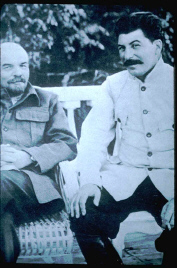
Lenin and Joseph Stalin
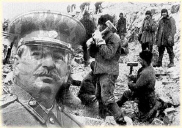 Stalin sent millions to forced
labor camps for criticizing the communist state. Stalin sent millions to forced
labor camps for criticizing the communist state. | | |
|
|
|
5.
|
Joseph Stalin was
a
a. | democrat | c. | democratic communist | b. | democratic socialist | d. | communist dictator |
|
|
|
6.
|
Stalin wanted to turn the
Soviet Union into
a. | a communist industrial world
power | c. | capitalist
state | b. | democratic republic | d. | capitalist industrial world
power |
|
|
|
7.
|
Which statement is true about
Stalin?
a. | he was a communist who was concerned
about the civil liberties and freedom of the ordinary Soviet citizen | c. | he was a socialist who only cared about industrialization,
reform of the farm system and protection of private property | b. | he was a brutal communist dictator who was responsible for
the deaths of millions of his own people. | d. | he was none of these |
|
|
|
THE RISE OF FASCISM IN
ITALY
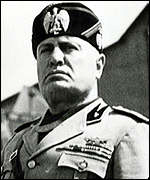
Benito Mussolini
 | While Stalin was consolidating his power in the Soviet Union, Benito Mussolini
was establishing a totalitarian regime in Italy. In 1919, Mussolini had begun his rise to
power by advertising for war veterans to fight the politicians, who, in Mussolini's view, were
destroying Italy. This mobilization was the beginning of fascism, a new political movement that
consisted of a strong, centralized government headed by a powerful dictator. Fascism was rooted in
the nationalism that had reshaped Europe over the past century. Mussolini dreamed of making Italy
a great power in the world.
Unlike Stalin's Communist regime, Mussolini's
Fascist state did not attempt to control farms and factories . In fact, many discontented veterans,
jobless youth, and businesspeople greatly feared the spread of communism to Italy. These people
became firm supporters of Mussolini. In 1921, Mussolini established the Fascist Party, which then won
35 seats in the Italian parliament. A year later, after Mussolini staged a march on Rome with
thousands of his black-shirted followers, the Italian king allowed him to form a new government.
Calling himself Il Duce, or "the chief," Mussolini gradually extended Fascist
control to every aspect of Italian life. Tourists marveled that Il Duce had even "made the
trains run on time ." Mussolini achieved this efficiency, however, by crushing all opposition
and by making Italy a totalitarian state. | | |
|
|
|
8.
|
Benito Mussolini was a
a. | Communist | c. | Republican leader | b. | Democratic leader | d. | Fascist leader |
|
|
|
9.
|
Benito Mussolini was elected to
power and turned Italy into _____
a. | a Communist
state | c. | a totalitarian
dictatorship | b. | a monarchy | d. | a democratic state |
|
|
|
10.
|
According to the author,
European Facism is rooted in
a. | economics | c. | extreme internationalism | b. | extreme nationalism | d. | democracy |
|
|
|
THE NAZIS TAKE OVER GERMANY
In Germany,
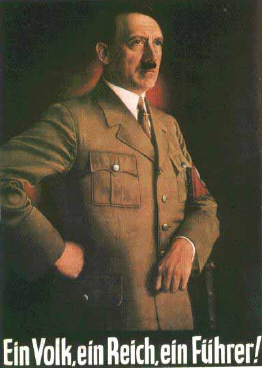
Adolf Hitler
“One People, One State, One
Leader”
| Hitler laid out
the basic beliefs of Nazism in his book Mein Kampf ("My Struggle"), published in two
volumes in 1925 and 1927. A type of fascism, Nazism was based on extreme nationalism . Hitler,
who had been born in Austria, dreamed of uniting all German-speaking people in a great German empire.
To this element of nationalism, Hitler added his theories about race. In his view, Germans-especially
blue-eyed, blond-haired "Aryans"-formed a "master race" that was destined to rule
the world. He claimed that the Jews were destroying German culture.
A third element of Nazism
was national expansion . Hitler believed that for Germany to thrive, it needed more lebensraum, or
living space. One of the Nazis' aims, as Hitler wrote in Mein Kampf was "to secure for the
German people the land and soil to which they are entitled on this earth," even if this could be
accomplished only by "the might of a victorious sword."
The Great Depression helped
the Nazis come to power. By 1932, some 6 million Germans were unemployed. Many of these desperate
people turned to Hitler as their last hope. In elections held in March 1932, the Nazis won more votes
than any other party, though not a majority. In January 1933, Hitler was appointed chancellor (prime
minister) .
Once in power, the Fuhrer quickly dismantled Germany's democratic Weimar
Republic. In its place he established what he called the Third Reich, or Third German Empire. Like
the first German empire (the Holy Roman Empire established by Charlemagne), and unlike the
short-lived second empire established by Bismarck in the 19th century, the Third Reich, according to
Hitler, would be a "Thousand-Year Reich." | | |
|
|
|
11.
|
What was the name of the book
in which Hitler laid out his basic ideas about government and society?
a. | Mein Kampf
| c. | Mein
Furher | b. | The Manifesto | d. | Das Capital |
|
|
|
12.
|
One of the reasons Hitler
invaded Eastern Europe and Russia is that Germany needed lebensraum. What is lebensraum?
a. | destruction of a nations
enemies | c. | revenge | b. | superiority | d. | living space |
|
|
|
13.
|
The Nazi’s used _____ to
gain win elections in Germany in 1932
a. | the
depression | c. | fear and suspicion
of the Jews | b. | hatred of the Treaty of Versailles | d. | all of these |
|
|
|
14.
|
Hitler said that he was
building the new German state on the foundation of the Holy Roman Empire established by Charlemagne, and the short-lived second empire
established by Bismarck in the 19th century. He called this empire
a. | the New Weirmar
Republic | c. | the Weirmar
Republic | b. | the Third Reich | d. | the German Republic |
|
|
|
15.
|
Hitler and Mussolini were
both
a. | Communists | c. | Anarchist’s | b. | Democratic | d. | Facists |
|
|
|
MILITARISTS GAIN CONTROL IN
JAPAN
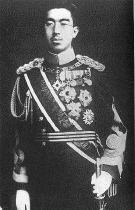
Emporer Hirohito
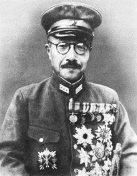
General
Tojo | Halfway around the world from Germany, nationalistic military leaders in Japan
were trying to take control of their government. These leaders shared Hitler's belief in the
need for more "living
space" for a growing populationand the superiority of the Japanese race. The
militarists launched a surprise invasion of the Chinese province of Manchuria in 1931 They considered
the Chinese to be an inferior race. Within several months, Japanese troops controlled the entire
province, a resource-rich area nearly as large as Alaska which they ruled with harsh
brutality.
Japan also occupied Korea and treated the Korean people with the same contempt they
had for the Chinese
The League of Nations had been established after World War I to
prevent such aggressive acts. In this first test of its power, the League sent representatives to
Manchuria to investigate the situation . Their report condemned Japan, which simply quit the League .
Meanwhile, the success of the Manchurian invasion put the militarists firmly in control of
Japan's government. | | |
|
|
|
16.
|
Japan and Germany shared the
need for more living space and a belief in the superiority of their own race.
a. | true | c. | partly true | b. | false |
|
|
|
17.
|
What did the League of Nations
do when Japan invaded Manchuria
a. | investigated | c. | ignored Japan’s actions | b. | kicked Japan out of the
League | d. | appealed to the United States to
intervene |
|
|
|
18.
|
What was the attitude of the
Japanese toward the Chinese and Korean peoples?
a. | Japan saw Koreans and Chinese as
Asian equals | c. | Japan thought the
Chinese were inferior but not the Koreans | b. | Japan saw Koreans and Chinese as inferior to the Japanese
race. | d. | Japan thought the Koreans were inferior but not the
Chinese |
|
|
|
19.
|
After the League of Nations
condemed Japan for their invision of Manchuraia, what did Japan do?
a. | they started to withdraw their
troops from Manchuria | c. | they quit the
League of Nations | b. | they blamed the invasion on U.S. aggression | d. | they went to war against the League of
Nations |
|
|
|
AGGRESSION IN
EUROPE
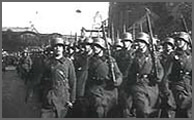 German troops invade the Rhineland German troops invade the Rhineland
The
failure of the League of Nations to take action against Japan did not escape the notice of
Europe's dictators. In 1933, Hitler felt bold enough to pull Germany out of the League. In 1935,
he began a military buildup in violation of the Versailles treaty. A year later, he sent troops into
the Rhineland, a German region bordering France and Belgium which was demilitarized as a
result of the Versailles treaty. He also signed the Rome- Berlin Axis Pact, which established a
formal alliance between Germany and Italy. The League did nothing to stop Hitler.
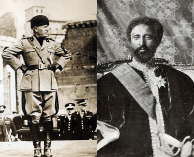 Mussolini (left) and Haile Selassie (right) Mussolini (left) and Haile Selassie (right)
Meanwhile, Mussolini began
building his new Roman Empire. His first target was Ethiopia, Africa's only remaining
independent country. By the fall of 1935, tens of thousands of Italian soldiers stood ready to
advance on Ethiopia. The League of Nations reacted with brave talk of "collective resistance to
all acts of unprovoked aggression."
When the invasion began, however, the League's
response was an ineffective economic boycott-little more than a slap on Italy's wrist. By June
1936, Ethiopia had fallen . In desperation, Haile Selassie, the ousted Ethiopian emperor,
appealed to the League for assistance. Nothing was done. "It is us today," he told them.
"It will be you tomorrow."
|
|
|
20.
|
What did the Rome- Berlin Axis Pact do?
a. | made Germany and Italy
enemies | c. | made Germany and
Italy allies | b. | made Germany reject the Versailles treaty | d. | made it legal to persecute the
Jews |
|
|
|
21.
|
What area of the world did
Italy attack?
a. | Southern
Africa | c. | the
Balkans | b. | North Africa | d. | Eastern Europe |
|
|
|
22.
|
As a result of the Italian
invasion of his country, who said "It is us today," he told
them. "It will be you tomorrow."
a. | the
Jews | c. | Anwar
Sadat | b. | Mussolini | d. | Haile Selassie |
|
|
|
United States Responds Cautiously
As disturbing as these events in Europe and Asia
were to Americans, most believed that the United States should not get involved . In 1928, the United
States had joined 61 other nations in signing the Kellogg-Briand Pact, in which they pledged never
to make war again. But this agreement still permitted defensive war and did not provide for using
economic or military force against nations that broke the pact. |
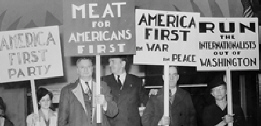 | | |
CLINGING TO
ISOLATIONISM
In the early
1930s, a flood of books argued that the United States had been dragged into World War I by greedy
bankers and arms dealers. Public outrage led to the creation of a congressional committee, chaired by
North Dakota senator Gerald Nye, that held hearings on these charges. The Nye committee fueled
the controversy by documenting the large profits that banks and manufacturers made during the
war.
The furor over these "merchants of death" made Americans more determined than
ever to avoid war. A poll taken in 1937 revealed that fully 70 percent of Americans believed that the
United States should not have entered World War I. Anti war feeling was so strong that the Girl
Scouts of America changed the color of its uniforms from khaki to green to appear less militaristic.
Across the country, college students staged antiwar rallies with banners proclaiming
"Scholarships, not battleships."
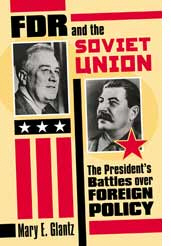 |
Americans' growing isolationism eventually had an impact on President
Roosevelt's foreign policy. When he had first taken office in 1933, Roosevelt had felt
comfortable reaching out to the world in several ways. He officially recognized the Soviet Union in
1933 and agreed to exchange ambassadors with Moscow. He continued the policy of nonintervention in
Latin America, begun by Presidents Coolidge and Hoover, with his Good Neighbor policy and withdrew
armed forces stationed there. In 1934, Roosevelt pushed the Reciprocal Trade Agreement Act through
Congress . This act lowered trade barriers by giving the president the power to make trade agreements
with other nations and was aimed at reducing tariffs by as much as 50
percent.
| | |
Beginning in 1935,
however, Congress passed a series
of Neutrality Acts in an effort to keep the United States out of future wars. The first two acts
outlawed arms sales or loans to nations at war. The third act was passed in response to fighting that
broke out in Spain in 1936, between the troops of the Fascist general Francisco Franco and forces
loyal to the country's elected government. This act extended the ban on arms sales and loans
to nations undergoing civil wars.
|
|
|
23.
|
Which statement is true about
the United States in the 1930’s
a. | America was anxious to get involved
in Europe so it could show American superiority | c. | America wanted to stay out of the wars in Europe and
Asia | b. | America wanted to get involved in Europe and Asia to profit financially from
the wars | d. | Americans did not have any opinion
about Japanese and German aggression |
|
|
|
24.
|
What did President Roosevelt do
in regards to the Soviet Union?
a. | he did
nothing | c. | he condemned the
atrocities of Joseph Stalin | b. | he offered diplomatic recognition | d. | he condemned the dictatorship of Stalin over the Russian
people |
|
|
|
25.
|
Who did the Nye committee label
as the "merchants of death".
a. | the Fascists in Italy and
Germany | c. | the Japanese
because of their attacks on china | b. | the bankers and industrialists who made profits from World War
I | d. | those who favored the death
penalty |
|
|
|
26.
|
What was the purpose of the
Neutrality Acts passed by Congress in 1935
a. | keep the U.S. out of future
wars | c. | condemn Germany and
Japan | b. | force neutrality on Mexico and Latin America | d. | keep the U.S. out of the League of
Nations |
|
|
|
NEUTRALITY BREAKS
DOWN
Despite congressional efforts to legislate neutrality,
many Americans found it difficult not to take sides in the Spanish Civil War. When Hitler and
Mussolini came to Franco's aid early in the war, some 3,000 volunteers from the United States
responded by forming the Abraham
Lincoln Brigade and traveling to Spain to fight Franco. 'We knew, we just knew,"
recalled Martha Gellhorn, "that Spain was the place to stop fascism ." Among the volunteers
were African Americans still bitter about Mussolini's invasion of Ethiopia the year
before.
Such limited aid was not sufficient to stop the spread of fascism, however. Hitler and
Mussolini, who saw the conflict as a testing ground for their military power, supported Franco with
troops, weapons, tanks, and fighter planes. The Western democracies, fearful of triggering a larger
war, sent only food and clothing to the anti- Fascist forces . In early 1939, after a loss of 600,000
lives and at a cost of more than $15 billion, the resistance to Franco had collapsed. Europe now had
yet another totalitarian government.
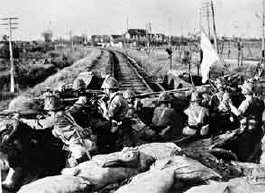
Japan attacks
Mancuria, China | Roosevelt himself found it impossible to remain neutral when Japan launched a
new attack on China in July of 1937. Since Japan had not formally declared war against China, the
president refused to enforce the Neutrality Acts . The United States continued sending arms and
supplies to China.
A few months later, Roosevelt spoke out strongly against isolationism in a
speech delivered in Chicago. He called on peace-loving nations to "quarantine," or isolate,
aggressor nations in order to stop the spread o of war.
| | |
At last Roosevelt seemed ready to take a stand against aggression-that is,
until isolationist newspapers exploded in protest and letters flooded the White House accusing the
president of leading the nation into war. Roosevelt backed off. For the moment the conflicts remained
"over there ."
|
|
|
27.
|
What was the purpose of the
Abraham Lincoln Brigade.
a. | to help the Communist anti-Soviet
forces in Russia | c. | to aid the
civil-rights movement in Spain | b. | to help the Communist anti-Franco forces in
Spain | d. | to aid the civil-rights movement in
Russia |
|
|
|
28.
|
What did Roosevelt do in
response to the Japanese attack on Manchuria, China?
a. | ignored
it | c. | tried to justify
it | b. | sent aid to
China | d. | blamed it on the
Republicans |
|
|
|
29.
|
Which statement is
true.
a. | Roosevelt saw the need for U.S.
intervention in foreign affairs but the people remained isolationist. | c. | Roosevelt saw the need for U.S. intervention in foreign
affairs and the people agreed with him | b. | Roosevelt did not see the need for U.S. intervention in foreign affairs but
the people did. | d. | Roosevelt did not see the need for
U.S. intervention in foreign affairs and the people
agreed |
|
|
|
30.
|
What did Hitler and Mussolini do about the civil war in Spain between the governemnt and
Franco?
a. | sent military help to
Franco | c. | tried to remain
neutral | b. | sent military help to the Spanish government | d. | declared war on Spain |
|
|
|
Austria and Czechoslovakia
Fall
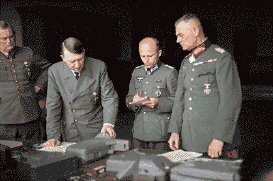 | On November 5, 1937, Hitler met with his most trusted
military advisers for a top-secret briefing. The Third Reich's future, he told them, depended on
solving the need for lebensraum . Where would new living space come from? Not from overseas colonies,
he declared, but from those nations nearest Germany- Austria and Czechoslovakia . When someone
protested that annexing those countries could provoke war, Hitler replied, "Germany's
problems can be solved only by means of force, and this is never without
risk. | | |
|
|
|
31.
|
Why was Hitler willing to risk
war in 1937?
a. | Germany needed a place to imprison
the Jews | c. | Germany needed a
buffer zone to protect against Russia | b. | Germany needed more living space | d. | Germany wanted revenge (lebensraum) against its old enemies from World War
I |
|
|
|
UNION WITH
AUSTRIA
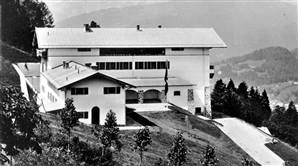 Berchtesgaden - Hitler’s Villa Berchtesgaden - Hitler’s Villa |
Hitler invited Austrian chancellor Kurt von Schuschnigg to meet
with him at his villa at Berchtesgaden, high in the Bavarian Alps. Austrian chancellor began
making polite conversation about the view and the lovely day,
For the next few hours, Hitler
demanded that Schuschnigg appoint Austrian Nazis to key government posts . | | |
By the end of the meeting, Hitler had bullied Schuschnigg
into signing an agreement to bring Austrian Nazis into his government. On returning home, Schuschnigg
had second thoughts about the agreement and informed Hitler . Hitler was furious. On March 12, 1938,
German troops marched into Austria unopposed, to cheering Austrian people, forcing Schuschnigg
to resign . Two days later, Germany announced that its Anschluss, or "union," with Austria
was complete . The United States and the rest of the world did nothing.
|
|
|
32.
|
Hitler was able to annex
Austria with ease because most of the Austrian people wanted union with Germany. When Hitler marched
into Austria, what did the rest of the world do to oppose him?
a. | they did
nothing | c. | appealed to the
League of Nations | b. | they protested the action | d. | they threatened Germany with an
embargo |
|
|
|
33.
|
Hitler was born in Austria and
fought in World War I for Germany. We can infer that Hitler considered Austria to
be
a. | a neutral
state | c. | a part of
Germany | b. | an enemy state | d. | a buffer between Serbia and
Germany |
|
|
|
BARGAINING FOR THE SUDETENLAND
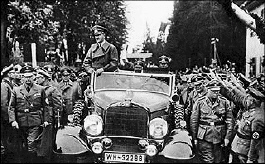
Hitler enters Czechoslovakia | Hitler then turned
to Czechoslovakia . When the Austro-Hungarian Empire was broken up at the end of World War I, the
Sudetenland, a mountainous region inhabited by 3 million German-speaking people, had been joined to
Czechoslovakia . In the spring of 1938, Hitler charged that the Czechs were abusing the Sudeten
Germans, and he began massing troops on the Czech border. The American correspondent William Shirer,
then stationed in Berlin, wrote in his diary: "The Nazi press [is] full of hysterical
headlines. All lies. Some examples : `Women and Children Mowed Down by Czech Armored Cars,' or
`Bloody Regime-New Czech Murders of Germans ."'
| | |
Early in the crisis, both France and Great Britain promised to protect
Czechoslovakia. Then, just when war seemed inevitable, Hitler invited French premier Edouard Daladier
and British prime minister Neville Chamberlain to meet with him in Munich. When they arrived, the
Fuhrer declared that the Sudetenland would be his "last territorial demand." In their eagerness to avoid war, Daladier and
Chamberlain chose to believe him. On September 30, 1938, they signed the Munich Pact,
which turned the Sudetenland over to Germany without a shot being fired.
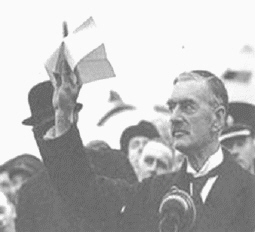
Chamberlain fooled by
Hitler | Chamberlain returned home to wildly cheering crowds . Waving a copy of the
Munich agreement, he proclaimed: "My friends . . . . there has come back from Germany peace with
honor. I believe it is peace in our time." The crowd joyously responded by chanting "Good
old Neville" and singing "For he's a jolly good fellow."
These sentiments
were not shared by Winston Churchill, Chamberlain's political rival for the leadership of Great
Britain. In Churchill's view, by signing the Munich Pact, Daladier and Chamberlain had adopted a
shameful policy of appeasement, or giving up principles to pacify an
aggressor
| | |
As Churchill
bluntly put it, "Britain and France had to choose between war and dishonor. They chose dishonor.
They will have war." Nonetheless, the House of Commons approved Chamberlain's policy toward
Germany by a vote of 366 to 144. Churchill responded with a warning.
|
|
|
34.
|
Why were the Germans upset
about the Sudetenland situation.
a. | former German territory was given to
the country of Czechoslovakia by the Versailles
treaty | c. | the Nazi’s thought all German
speaking people should be part of Germany | b. | the Germans in the Sudetenland
claimed they were being mistreated | d. | all of these are true |
|
|
|
35.
|
What did England and France do
about Hitler’s demands regarding Czechoslovakia?
a. | They told Hitler they would go to
war if he invaded | c. | They asked Hitler
to wait a year before invading | b. | They gave in to Hitler demands. (appeased
him) | d. | They told Hitler the Germans in Czechoslovakia should learn to speak
Czech. |
|
|
|
36.
|
This person has become a symbol
for appeasing dictators because he returned from Germany waving the Munich Agreement signed by Hitler
and claimed, “there will be peace in our time”
a. | Edouard
Daladier | c. | Winston
Churchill | b. | Rudolf Hess | d. | Neville Chamberlain |
|
|
|
37.
|
What was the name of the
agreement signed by Hitler, Daladier of France, and Chamberlain of England that allowed Hitler to
take the Sudetenland from Czechoslovakia?
a. | The white
Paper | c. | The Munich
Pact | b. | The Treaty of Versailles | d. | The Sudetenland Treaty |
|
|
|
38.
|
What did Winston Churchill have
to say about he agreement between Hitler and Chamberlain?
a. | Chamberlain did the right
thing. | c. | England should stay out of European
affairs because it could lead to war | b. | England will have to go to war because Chamberlain did not stand up to
Hitler | d. | Hitler can be trusted but Chamberlain can
not |
|
|
|
German Offensive
Begins
Contrary to his promise at Munich, Hitler was not
finished expanding the Third Reich. As dawn broke on March 15, 1939, German troops poured into
what remained of Czechoslovakia. At nightfall Hitler gloated, "Czechoslovakia has ceased to
exist." After that, the German dictator turned his land-hungry gaze toward Germany's
eastern neighbor, Poland.
The Soviet Union paves the way for Germany to invade
Poland
Like
Czechoslovakia, Poland had a
sizable German-speaking population. In the spring of 1939, Hitler began his familiar routine,
charging that Germans in Poland were mistreated by the Poles and needed his protection. Some people
thought that this time Hitler must be bluffing . After all, an attack on Poland might bring Germany
into conflict with the Soviet Union, Poland's eastern neighbor. At the same time, such an attack
would most likely provoke a declaration of war from France and Britain-both of whom had promised
military aid to Poland . The result would be a two-front war. Fighting on two fronts had exhausted
Germany in World War I. Surely, many thought, Hitler would not be foolish enough to repeat that
mistake.
Hitler took the chance, though, and his luck held. As tensions rose over Poland,
Stalin, despite his deep dislike and distrust of the Nazis, decided he had more to lose than to gain
in a war against Germany. On August 23, 1939, the Soviet Union and Germany signed a nonaggression
pact, in which they agreed not to fight each other. They also signed a second, secret pact,
agreeing to divide Poland between them. With the danger of a two-front war eliminated, the fate of
Poland was sealed. In this way, the Soviet Union allowed Hitler to invade
Poland.
|
|
|
39.
|
Why was Germany afraid of
fighting a two front war in Western and Eastern Europe
a. | Germany was afraid of
Poland | c. | Germany had the bad experience of
fighting a two front war in World War I | b. | Germany had no air force | d. | Germany had never fought a two front war
before |
|
|
|
40.
|
Why did Germany want to invade
Poland?
a. | there were many Germans living in
Poland because the Versailles treaty took territory away from Germany and gave it to
Poland | c. | most of Germany’s
concentration camps were in Poland | b. | Poland was a Jewish country | d. | France and England had a treaty with
Poland |
|
|
|
41.
|
What event made Germany feel
comfortable that it could invade Poland without having to worry about a two front
war?
a. | the non-aggression pact with
Russia | c. | the non-aggression pact with
England | b. | the non-aggression pact with France | d. | the pacifist attitude of the United
States |
|
|
|
42.
|
When Germany invaded Poland
from the west, what did the Soviet Union do?
a. | nothing | c. | sided with the Poles and threatened
Germany | b. | invaded Poland from the east | d. | protested to the League of
Nations |
|
|
|
43.
|
What is a two front
war?
a. | a war in which you are fighting two
different enemies, at different places at the same time | c. | a war that you fight with maps and strategy instead of
troops | b. | a war in which you try to keep your enemies in front of
you | d. | a war that you fight on land and at
sea |
|
|
|
BLITZKRIEG IN
POLAND
As day broke on September 1, 1939, German warplanes roared over Poland,
raining bombs on military bases, airfields, railroads, and cities . At the same time, German tanks
rumbled across the Polish countryside, spreading terror and confusion. This invasion was the first
test of Germany's newest military strategy, the blitzkrieg, or lightning war. The new tactics
enabled the Germans to take the enemy by surprise and then quickly crush all opposition with
overwhelming force . Britain and France declared war on Germany on September 3.
|
|
|
44.
|
What was the new German
military strategy called
a. | lebensraum | c. | tank warfare | b. | blitzkrieg | d. | chemical
warfare |
|
|
|
45.
|
Germany invaded Poland on
September 1, 1939. What did England and France do?
a. | protested to the League of Nations
on September 3 | c. | declared war on
Germany on Sept. 3 1939 | b. | requested a peace conference with Hitler | d. | nothing |
|
|
|
THE PHONY
WAR
For the next few
months, an eerie calm settled over Europe . Bored French and British troops on the Maginot Line, a
system of fortifications along France's eastern border, sat staring into Germany, waiting for
something to happen. Equally bored German troops sitting on the Siegfried Line a few miles away
stared back. The blitzkrieg had given way to what the Germans called the sitzkrieg ("sitting
war"), and the English called the phony war. To fight the tedium, French officer Denis Barlone
made sure that his men were well fed
This deceptive peace was first broken not by Germany but
by the Soviet Union. After occupying eastern Poland, Stalin began annexing other regions that the Soviet Union had lost at the end of
World War I. The Baltic states of Estonia, Latvia, and Lithuania fell with little struggle .
However, Finland-a country that journalist William Shirer admired as "the most decent and
workable little democracy in Europe"-resisted. Late in 1939, Stalin sent his Soviet army into
Finland. After three months of fierce winter fighting, the outnumbered Finns surrendered. Shirer
wrote in his diary, "Stalin reveals himself of the same stamp as Hitler."
On April
7, 1940, a leading German newspaper announced, "Germany is ready. Eighty million pairs of
[German] eyes are turned upon the Fuhrer." Two days later, the rest of the world
stared, unbelieving, as Hitler launched a surprise invasion of Denmark and Norway. Germany
said this action was necessary in order "to protect [those countries] freedom and
independence ." Next, the German blitzkrieg was turned against the Netherlands, Belgium, and
Luxembourg, which were overrun by the end of May. The phony war had suddenly become painfully
real.
|
|
|
46.
|
What did Stalin do after he
invaded Russia?
a. | He took over many of the smaller
countries on the Soviet border | c. | He turned on Hitler and invaded Germany | b. | He made peace with his
neighbors | d. | nothing |
|
|
|
47.
|
What small country held off the
entire Soviet army for three months?
a. | Poland | c. | Lithuania | b. | Latvia | d. | Finland |
|
|
|
48.
|
After taking control of Poland,
what new country did Hitler attack in 1940?
a. | Denmark | c. | Belgium | b. | Norway | d. | all of these |
|
|
|
49.
|
The French thought that the
Maginot Line would protect them from a German invasion such as the invision that happened in World
War I. What was the Maginot Line?
a. | An imaginary line between France and
Germany that France warned Germany not to cross | c. | A series of forts between England, France and
Germany | b. | An earthquake fault between Germany, England and
France | d. | A series of forts and fortifications along the border
between Germany and France |
|
|
|
Britain Fights On While
France Surrenders
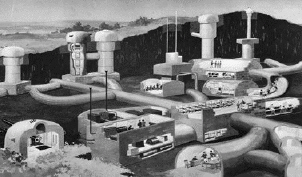
The Maginot
Line | Before the war, France had built the massive fortifications of the Maginot
Line on its border with Germany. With the invasion of Belgium, however, Germany threatened to bypass
the line. French and British troops were sent north into Belgium . Hitler's generals had
anticipated this reaction and sent their tanks slicing through the Ardennes, a region of wooded
ravines in northeast France that the Allies thought was impassable. | | |
THE FALL OF FRANCE
Suddenly, the Allied forces in the north were cut off.
Outnumbered, outgunned, and pounded from the air, they fled to the beaches of Dunkirk, on the English
Channel. In less than a week, a makeshift fleet of fishing trawlers, tugboats, river barges, pleasure
craft, and almost anything else that would float ferried about 340,000 Allied troops to safety across
the Channel.
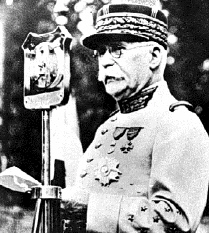
Marshal
Petain |
A few days later, Italy entered the war on the side of Germany and invaded
France from the south as the Germans closed in on Paris from the north. On June 17, 1940, Marshal
Henri Petain, an aged military commander and World War I hero, told his country, "We must stop
fighting." Four days later, at Compiegne, as William Shirer and the rest of the world watched,
Hitler handed French officers his terms of surrender. Germans would occupy the northern part of
France, and a Nazi-controlled puppet government, headed by Marshal Petain, would be set up at Vichy, in southern
France
| | |
After France fell, a French
general named Charles de Gaulle fled to England, where he set up a government-in-exile . De
Gaulle proclaimed defiantly, "France has lost a battle, but France has not lost the
war."
|
|
|
50.
|
France built a long line of
fortifications that it believed would protect it against a German invasion. What was it
called.
a. | the Siegfried
Line | c. | the Normandy Beach
Fortifications | b. | the Maginot Line | d. | the White Cliffs of Dover |
|
|
|
51.
|
The German generals outflanked
the British and French armies and the British found themselves stranded on the beaches of
a. | Norway | c. | Dunkirk | b. | Ardienne | d. | Compiegne |
|
|
|
52.
|
France surrendered to Germany
and the French Vichy government became allies of Germany. Who was head of the Vichy
government?
a. | Marshall
Petain | c. | Winston
Churchill | b. | Charles DeGaulle | d. | Adolf Hitler |
|
|
|
53.
|
Which country joined Germany in
occupying France
a. | Austria | c. | Finland | b. | Italy | d. | Soviet Union |
|
|
|
THE BATTLE OF
BRITAIN
| "The final German victory over England is only a matter of time,"
wrote a German general after the fall of France. In the summer of 1940, the Germans began to assemble
an invasion fleet along the French coast. Because its naval power could not compete with that of
Britain, however, Germany launched an air war at the same time. The Luftwaffe, or German air force,
began making bombing runs over Britain . Its goal was to gain total control of the skies by
destroying Britain's Royal Air Force (RAF) . Hitler had 2,600 planes at his disposal. On a
single day-August 15-1,000 of his planes ranged over Britain . Every night for two solid months, bombers pounded
London. The Battle of Britain raged on through the summer and the fall. Night after night, up to
a thousand German planes pounded British targets . At first the Luftwaffe concentrated on airfields
and aircraft factories. Next it targeted cities . | | |
The RAF fought back brilliantly. With the help of a new technological device
called radar-which accurately plotted the flight paths of German planes, even in darkness-British
pilots unleashed deadly air strikes against the enemy. On September 15, the RAF shot down 56 German
planes. They lost only 26 aircraft . Two days later, the Fuehrer called off the invasion of Britain
indefinitely. "Never in the field of human conflict," said Churchill in praise of the RAF
pilots, `was so much owed by so many to so few."
|
|
|
54.
|
What was the British air force
called.
a. | Luftwaffe | c. | USAF | b. | RAF | d. | Royal
Air |
|
|
|
55.
|
What new technological device
helped the British Air Force to hold off the German Luftwaffe in the
Battle of Britain?
a. | radar | c. | radio | b. | television | d. | code breaking machines |
|
|
|
56.
|
By the end of 1940 all of
Europe and North Africa was controlled by the Axis powers. Only one country stood between Germany and
total domination of the continent. What was it.
a. | Russia | c. | France | b. | England | d. | Norway |
|
|
|
57.
|
What famous city was bombed in
1940 in the Battle of Britain?
a. | Paris | c. | Moscow | b. | Berlin | d. | London |
|
|
|
58.
|
Most historians agree that war
with Germany became inevitable because England and France ________ Hitler and did not stand up to him
when he started invading the countries of Europe..
a. | opposed | c. | appeased | b. | overestimated | d. | liked |
|
|
|
The Persecution
Begins
On April 4, 1933,
barely three months after Hitler took power in Germany, he ordered all "non-Aryans" to be
removed from government jobs. This order was one of the first moves in a campaign for racial purity
that would become the Holocaust-the systematic murder of 11 million people across Europe, more than
half of whom were Jews
WHY THE JEWS?
Although Jews were not the only victims of
the Holocaust, they were the center of the Nazis' target . Anti-Semitism, or hatred of Jews, had
deep roots in European history. For decades, many Germans looking for a scapegoat, or someone to
blame for their failures and frustrations, had targeted the Jews . As a result, when Hitler blamed
the Jews for Germany's defeat in World War I and for its economic problems following the war,
many Germans were more than ready to support him
As the Nazis tightened their hold on Germany,
their persecution of Jews increased. In 1935, the Nuremberg Laws stripped Jews of their civil rights
and property if they tried to leave Germany. To make identification easier, Jews over the age of six
had to wear a bright yellow Star of David on their clothing | 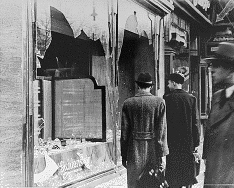
Kristallnacht
Worse was
to come. On November 9, 1938, a night that came to be known as Kristallnacht, or "crystal
night"-the night of broken glass-gangs of Nazi storm troopers attacked Jewish homes, businesses,
and synagogues across Germany. An American who witnessed the violence in Leipzig wrote, "Jewish
shop windows by the hundreds were systematically and wantonly smashed. . . . The main streets of the
city were a positive litter of shattered plate glass." Afterward, the Nazis blamed the Jews for
the destruction. More than 20,000 Jews were arrested and sent to concentration camps. At the same
time, a German official announced, "The Jews will pay a collective fine of one billion marks, 20
percent of their property." | | |
|
|
|
59.
|
What were the laws called that
took away the civil rights of the Jews?
a. | Berlin
Doctrine | c. | Nuremberg
Laws | b. | anti-Semitic laws | d. | Nazi Laws |
|
|
|
60.
|
When did hatred of the Jews
start in Europe?
a. | 1910 | c. | throughout European
history | b. | World War I | d. | 1930 |
|
|
|
61.
|
What did they call November 9,
1938 when Jewish shops were destroyed throughout Germany and Jews were harassed
a. | Kristallnacht | c. | Nuremberg Night | b. | Storm Trooper Night | d. | Anti-Semitic Night |
|
|
|
62.
|
Who did the Nazi’s blame
for the night of the broken glass?
a. | out of control
teens | c. | the
Jews | b. | the Communists | d. | the Brown Shirts |
|
|
|
THE PLIGHT OF JEWISH
REFUGEES
| Beginning in 1933, tens of thousands of
Jews fled Germany each year. After Kristallnacht, the Nazis tried to speed Jewish emigration but
encountered difficulty. France already had 40,000 Jewish refugees and did not want more. The British,
who were already admitting about 500 Jewish refugees a week, worried about fueling anti-Semitism if
that number were to increase . Late in 1938, Germany's foreign minister observed, "We all
want to get rid of our Jews. The difficulty is that no country wishes to receive them
."
| | |
About 60,000
refugees-including such distinguished people as physicist Albert Einstein, author Thomas Mann,
architect Walter Gropius, and theologian Paul Tillich-fled to the United States . More could have
come if the United States had been willing to relax its strict immigration quotas . This was not done, partly
because of widespread anti-Semitism among Americans and partly because many Americans feared that
letting in more refugees during the Great Depression would mean competition for scarce
jobs.
After war broke out in Europe in 1939, Americans also feared that opening the door
to refugees from Germany would allow "enemy agents" to enter the United States . President
Roosevelt said that while he sympathized with the Jews, he would not "do anything which would
conceivably hurt the future of present American citizens ."
Official indifference to the
plight of Germany's Jews was so strong that when the St. Louis-a German luxury liner filled with
refugees passed Miami in 1939, the Coast Guard followed it to prevent the passengers from attempting
to leave the ship for the United States . This decision was made even though 740 of the liner's
943 passengers had U.S . immigration papers . Passenger Liane Reif-Lehrer, who was just four years
old at the time, recalled, "My mother and brother and I were among the passengers who survived,
about a fourth of those on the ship. We were sent back to Europe and given haven in France, only to
find the Nazis on our doorstep again a few months later."
|
|
|
63.
|
The Nazi’s tried to
deport Germany’s Jews. Why did they have trouble doing so?
a. | It was too hard to get them to the
U.S. who had agreed to take them | c. | There were not enough trains to do so | b. | No other countries wanted
them | d. | The concentration camps were
full |
|
|
|
64.
|
What reason did Roosevelt give
for not allowing more Jews to enter the U.S. after war broke out in Europe
a. | he did not want to anger the
Germans | c. | he said that
America was a Christian nation | b. | he said we already had too many Jews | d. | he was afraid it would opened the door for foreign agents to enter the
U.S. |
|
|
|
65.
|
What did the St. Louis-a German luxury liner situation show ?
a. | Cuba and the United States hated the
Jews | c. | North and South America did not care
about the Jews | b. | The world though the Jews deserved what they were getting from the
Nazi’s | d. | North and South America were afraid
of the Nazi’s |
|
|
|
66.
|
In addition to anti-semitisim,
what other reason did Americans have for not wanting additional immigrants in the
country?
a. | Americans thought the Jews might
spread their religion | c. | Most Americans
supported Hitler | b. | Americans were afraid that Jews might take jobs away from
Americans | d. | Americans were afraid that Germany
would open concentration camps in the U.S. |
|
|
|
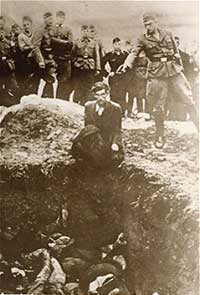 | The Final Solution
Unable to rid Germany of its Jews by forcing them to
emigrate, the Nazis adopted a new approach following Kristallnacht . Jews healthy enough to work were
sent to labor camps to perform slave labor. The rest would be sent to extermination camps. This
horrifying plan amounted to genocide, or the deliberate and systematic killing of an entire people
.
THE CONDEMNED
The Nazis' "final solution" rested on their
belief that "Aryans" were a superior people and that the strength and purity of this
"master race" must be preserved. To accomplish this, the Nazis condemned to slavery and
death not only the Jews but other groups that they viewed as inferior or unworthy or as "enemies
of the stat
| After taking power in 1933, the Nazis had concentrated on
silencing their political opponents-Communists, Socialists, liberals, and anyone else who spoke out
against the government. Once the Nazis had eliminated these enemies, they turned against other groups
in Germany. In addition to Jews, these groups included
" Gypsies-whom the Nazis believed to be an
"inferior race"
" Freemasons-whom the Nazis charged to be supporters of the
"Jewish conspiracy" to rule the world
" Jehovah's Witnesses-who refused
to join the army or salute Hitler
The Nazis also targeted other Germans whom they found unfit
to be part of the "master race," such as homosexuals. Beginning in 1939, the German
government rounded up these individuals and shipped them off to "special treatment"
centers, where they were "accorded a mercy death." By 1941, children near one of these
centers had become so used to seeing the special buses that were used to transport victims that they
would call out to each other, "Look, there's the murder box coming again."
As
the Nazis moved eastward, they added Poles, Ukrainians, and Russians to their growing list of
Untermenschen, or "subhumans," who were standing in the way of the expanding "master
race." After the invasion of Poland, for example, hundreds of thousands of Poles were killed or
shipped to Germany to perform slave labor. The emptied Polish towns and farms were resettled with
Germans seeking lebensraum | | |
|
|
|
67.
|
What is the formal name for killing an entire race or nation of
people?
a. | Kristallnacht | c. | genocide | b. | emigration | d. | pesticide |
|
|
|
68.
|
Why did the Nazi’s
imprison homosexuals, the mentally retarded, the insane, the disabled, the
incurably ill and the Jews?
a. | They believed they were costing the
German economy too much money | c. | They wanted to maintain the purity of the Aryan
race | b. | They thought these groups could become spies for
Britain | d. | These groups would not join the Nazi
party. |
|
|
|
69.
|
The Jehovah's Witnesses are Christians. Why were they sent to concentration
camps?
a. | They would not say, “Heil
Hitler” | c. | They were
anti-German | b. | They were pro Israel | d. | They were different |
|
|
|
70.
|
Which statement below would
compare to a statement a Nazi might make?
a. | There are no good
Jews | c. | We must maintain the purity of our
race | b. | Your group is responsible for the problems of my
group | d. | All of these attitudes are typical of Nazi
attitudes |
|
|
|
71.
|
Why did the Nazi’s create
the “Final Solution” to the Jewish problem?
a. | they were unable to get all of the
Jews to emigrate to other countries | c. | The Jews refused to serve in the German
military | b. | they did not want to use the Jews as slave labor in German
factories | d. | the Jews were lazy and just wanted
to attend school |
|
|
|
72.
|
The Nazi’s deported Jews
from Germany to other countries in Europe. But as they conquered these European countries the Jews
ended up in German territory again. What was the plan called to rid Europe of all
Jews?
a. | Kristallnacht | c. | The Genocide Plan | b. | The Final Solution | d. | Mien Kampf |
|
|
|
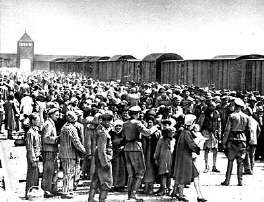 | CONCENTRATION CAMPS
The Nazis began implementing their "final solution" in Poland. Nazi
murder squads were assigned to round up Jews, strip them of their clothing, and then shoot them in
cold blood. Other Jews were herded into dismal ghettos, or Jewish sections, in Polish cities
and were left to starve or die from disease . Still others were dragged from their homes and herded
into trains and trucks for shipment to concentration camps. In this process, families were often
separated, sometimes forever |
Life in the camps was a cycle of
hunger, humiliation, and work that only ended with death. The prisoners were crammed into crude
wooden barracks that held up to a thousand people each. They shared their crowded quarters- as well
as their meager meals of thin soup and occasional scraps of bread or potato-with hordes of rats and
fleas. Hunger was so intense, recalled one survivor, "that if a bit of soup spilled over,
prisoners would converge on the spot, dig their spoons into the mud and stuff the mess into their
mouths ."
The prisoners worked from dawn to dusk, seven days a week, until they collapsed
. Those too weak to work were killed. Some, like Rudolf Reder, endured. He was one of only two Jews
to survive the camp at Belzec, Poland. | | |
|
|
|
73.
|
What were sections of Polish
cities, were Jews were imprisoned called?
a. | urban war
camps | c. | slums | b. | city prisons | d. | ghetto’s |
|
|
|
74.
|
Which statement is true about
the concentration camps?
a. | if a Jewish person worked hard there
was a good chance he or she would survive the camps | c. | none of these statements are true | b. | only Jewish children were able to survive the
camps | d. | very few Jews survived the
camps |
|
|
|
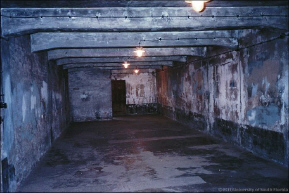 | EXTERMINATION
As deadly as overwork, starvation, beatings, and bullets were, they did not
kill fast enough to satisfy the Nazis. Late in 1941, the Germans built six death camps in Poland.
Each camp had several huge gas chambers in which as many as 6,000 lives could be snuffed out
daily.
| When prisoners arrived at Auschwitz, the largest of the
death camps, they had to parade by several SS doctors . With a wave of the hand, the doctors
separated those strong enough to work from those who would die that day. Both groups were told to
leave all their belongings behind, with a promise that they would be returned later. Those destined
to die were then led into a room outside the gas chamber and were told to undress for a shower. To
complete the deception, they were even given pieces of soap. Finally, they were led into the chamber
and poisoned with cyanide gas that spewed from vents in the walls. This orderly mass extermination
was sometimes carried out to the accompaniment of cheerful music played by an orchestra of camp
inmates who had temporarily been spared execution
At first the bodies were buried in huge
pits. At Belzec, Rudolf Reder was part of a 500-man death brigade that labored all day, he said,
"either at grave digging or emptying the gas chambers." But the decaying corpses gave off a
stench that could be smelled for miles around. Worse yet, mass graves left evidence of the mass
murder. At some camps, to try to cover up the evidence of their slaughter, the Nazis installed huge
crematoriums, or ovens in which to burn the dead. At other camps, the bodies were simply thrown into
a pit and set on fire .
Gassing was not the only method of extermination used in the camps.
Prisoners were also shot, hanged, or injected with poison. Still others died as a result of horrible
medical experiments carried out by camp doctors . Some of these victims were injected with deadly
germs in order to study the effect of disease on different groups of people. Others were forced to
exist only on seawater in experiments to determine how long shipwrecked seamen could survive . Many
more were used to test methods of sterilization, a subject of great interest to some Nazi doctors in
their search for ways to improve the "master race." | | |
|
|
|
75.
|
Why did the Jews march into the
gas chambers without protest?
a. | they did not go into the gas
chambers quietly | c. | they wanted to die
because there was no hope | b. | they thought they were going to take showers after the long train
trip | d. | they thought gas chambers were dining
rooms |
|
|
|
76.
|
It was possible to kill up to
____ persons a day in each death camp.
a. | 1000 | c. | 6000 | b. | 2000 | d. | 15000 |
|
|
|
77.
|
Which method did the
Nazi’s use to exterminate Jews in the concentration camps?
a. | gassing | d. | poison injections | b. | shooting | e. | all of these methods were used | c. | hanging |
|
|
|
78.
|
Why did the Nazi’s prefer
to burn the dead bodies of Jews in crematoriums?
a. | they wanted to get rid of evidence
of genocide | c. | they wanted to
insult the Jewish religion | b. | they used the ovens to create electricity | d. | they did not prefer to burn the dead bodies and left them to rot because it
was too much trouble |
|
|
|
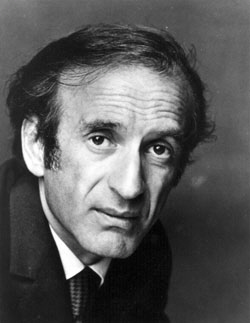
Elie Wiesel | THE
SURVIVORS
Six million Jews died in the death camps
and in Nazi massacres . But some miraculously escaped the worst of the Holocaust . Many had help from
ordinary people who were appalled by the Nazis' treatment of Jews. These people risked death by
hiding Jews in their homes or by helping them escape to neutral countries such as Sweden and
Switzerland .
Some Jews even survived the horrors of the concentration camps. In Gerda
Weissmann Klein's view, survival depended as much on one's spirit as on getting enough to
eat . "I do believe that if you were blessed with imagination, you could work through it,"
she wrote. "If, unfortunately, you were a person that faced reality, I think you didn't
have a chance." Those who did come out of the camps alive were forever changed by what they had
witnessed . For survivor Elie Wiesel, who entered Auschwitz in 1944 at the age of 14, the sun had set
forever. | | |
|
|
|
79.
|
About how many Jews died in the
Nazi death camps?
a. | 11
million | c. | 6
million | b. | 20 million | d. | 2 million |
|
|
|
80.
|
Most Jews who survived the
concentration camps were able to put it out of their minds and lead normal lives
|
|
|
The United States Musters
Its Forces
As German tanks
thundered across Poland, Roosevelt issued an official proclamation of neutrality as required by
the Neutrality Acts. At the same time, he began to prepare the nation for the struggle he feared lay
just ahead.
MOVING
CAUTIOUSLY AWAY FROM NEUTRALITY
| On September 8, 1939, Roosevelt announced that he was calling a special
session of Congress to revise the Neutrality Acts. When Congress met two weeks later, the president asked for a
"cash-and-carry" provision, which would permit nations to buy American arms as long as they
paid cash and carried the goods home in their own ships. Providing the arms that would help France
and Britain defeat Hitler, Roosevelt argued, was the best way to keep America out of the war.
| |
Isolationists in Congress, such as Senator Arthur Vandenberg, argued just the
opposite, however. "I do not believe that we can become an arsenal for one belligerent without
becoming a target for another," Vandenberg said. After six weeks of heated debate, Congress
passed the Neutrality Act of 1939, and cash and- carry went into effect . | | |
|
|
|
81.
|
Why did Roosevelt ask Congress
to revise the Neutrality Act?
a. | so the U.S. could profit from
increased arms sales | c. | so he could remain
neutral but restricting sales of arms to European countries | b. | so he could help France and England with military
weapons | d. | so he could help the Soviet Union with
weapons |
|
|
|
82.
|
What did the “Cash and
Carry provision of the Lend Lease act say?
a. | if nations that bought arms did not
have cash to pay the U.S. would carry them until they could pay | c. | nations had to pay cash for the arms and carry them in
United States ships so the U.S. could make additional profit. | b. | nations had to pay cash for the arms and carry them to
Europe in their own ships | d. | Cash and carry did not mean any of
these things |
|
|
|
THE AXIS
THREAT
Over the next few months, America's cash-and-carry policy began to look
like too little, too late. By the summer of 1940, France had fallen and Britain was under siege by
the German Luftwaffe. Then, in September, Americans were jolted by the news that Japan, Germany, and Italy had signed a mutual defense
treaty, the Tripartite Pact. The three nations became known as the Axis
powers.
The Tripartite Pact was clearly aimed at keeping the United States out of
the war. Under the treaty, each Axis nation agreed to come to the defense of the others in case of
attack. This meant that if the United States were to declare war on any one of the Axis powers, it
would face its worst military nightmare-a two-ocean war, with fighting in both the Atlantic and the
Pacific.
Hoping to avoid this situation, Roosevelt scrambled to provide the British with
"all aid short of war." In June 1940, he sent Britain 500,000 rifles and 80,000 machine
guns to help replace those lost at Dunkirk. In September, the United States traded 50 old destroyers
for leases on British military bases in the Caribbean and Newfoundland. Even British prime minister
Winston Churchill later called this deal "a decidedly unneutral act."
|
|
|
83.
|
Which countries were part of
the Tripartite (Axis) powers?
a. | Germany, Russia, and
Italy | c. | Germany, Italy, Spain and
Japan | b. | Germany, Russia and Turkey | d. | Japan, Germany and Italy |
|
|
|
84.
|
In 1940 England was he only
country left in Europe that Germany had not conquered. Roosevelt wanted to help England but had to be
careful not to provoke Germany. Why was Roosevelt being so cautious?
a. | There were many German voters in the
United States and he did not want to loose their votes in the upcoming
elections | c. | Roosevelt agreed
with the approach that Neville Chamberlain took toward Germany, rather than the Churchill
approach | b. | If the U.S. went to war with Germany it would also have to fight Russia
and Roosevelt did not think we were strong enough to fight a war against the armies of both
nations | d. | If the U.S. went to war with Germany it would also have to
fight Japan and Roosevelt did not think we were strong enough to fight a war in the Atlantic and the
Pacific |
|
|
|
85.
|
Because Roosevelt was so
concerned about Germany he did nothing at all to help England in 1940
|
|
|
BUILDING AMERICA'S
DEFENSES
Meanwhile,
Roosevelt asked Congress to increase spending for national defense. After years of isolationism, the
United States was militarily weak. Critics pointed out that 18 countries had larger armies, that the
navy could hardly protect the Panama Canal, and that Italy's air force had more firepower than
that of the United States
In response, Congress dramatically boosted defense spending in 1940.
It also passed the nation's first peacetime military draft. Under the Selective Training and Service Act, 16 million men
between the ages of 21 and 35 were registered. Of these, 1 million were to be drafted for one year.
Roosevelt himself drew the first draft numbers . "This is a most solemn ceremony," he told
a national radio audience . "It is accompanied by no fanfare no blowing of bugles or beating of
drums. There should be none."
ROOSEVELT'S REELECTION
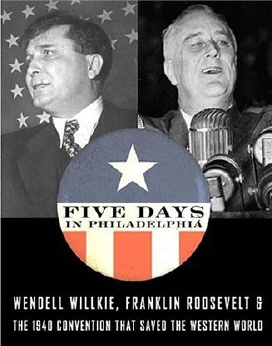 REP WILKIE VS DEM FDR REP WILKIE VS DEM FDR |
That same
year, Roosevelt decided to break the tradition of a two-term presidency, begun by George Washington,
and to run for reelection. To the great disappointment of isolationists, Roosevelt's Republican
opponent, a public utilities executive named Wendell Willkie, supported Roosevelt's policy of
aiding Britain. At the same time, both Willkie and Roosevelt promised to keep the nation out of war. Because there
was so little difference between the candidates, the majority of voters chose the one they knew best.
Roosevelt was reelected with nearly 55 percent of the votes cast. | | |
|
|
|
86.
|
Which statement below is true
about American defenses in 1940?
a. | The U.S. army was strong but the
navy and air force was weak | c. | The air force was weaker than Italy’s and the army was also weak, but
the navy was very strong and controlled the Panama canal | b. | The U.S. forces were stronger than the top 18 military
forces in the world | d. | none of these statements are
true |
|
|
|
87.
|
What did the Congress do about
American defenses in 1940?
a. | ignored American
defenses | c. | restricted any
defense spending until 1941 | b. | increased spending and tried to build up American
defenses | d. | said the Japanese would have to
attack the American navy before they would even think about
war |
|
|
|
88.
|
What American tradition did
Roosevelt break in 1940?
a. | The tradition set by George
Washington that a president should only serve two terms | c. | The tradition set by Washington that presidents should not leave office during
wartime | b. | The tradition set by Washington that England should fight its own
wars | d. | The tradition set by Washington that sitting presidents
should not run for office |
|
|
|
"The Great Arsenal of
Democracy"
Not long after the election, President Roosevelt held another of his
fireside chats on the radio.
There was no hope of negotiating a peace with Hitler, he told the nation . "No man can tame a
tiger into a kitten by stroking it." He also warned that if Britain fell, the Axis powers would
be left unchallenged to conquer the world, at which point, he said, "all of us in all the
Americas would be living at the point of a gun." To prevent such a situation, the United States
had to help defeat the Axis threat by turning itself into "the great arsenal of
democracy."
THE LEND-LEASE PLAN
By late 1940, however, Britain had no more
cash to spend in the arsenal of democracy. Consequently, Roosevelt suggested replacing cash-and-carry
with a new plan that he called lend-lease . Under this plan, the president would lend or lease arms
and other supplies to "any country whose defense was vital to the United States
."
Even though the isolationists were losing the support of the American public, they
argued bitterly against lend-lease. Congress finally passed the Lend-Lease Act in 1941 and supported
it with $7 billion. In all, the United States eventually spent $50 billion under the act
.
Britain was not the only nation to receive lend-lease aid . On June 22, 1941, Hitler ignored
his peace treaty with Stalin and invaded the Soviet Union with 3 million troops. The Fuehrer
confidently predicted victory within six weeks . But the Soviets resisted fiercely. As they pulled
back from the Nazi advance, they employed a scorched-earth policy, destroying everything that might
be of use to the invaders . Six weeks stretched into six months. Then, as the bitter Russian winter
set in, the German invasion ground to a halt.
Meanwhile, Roosevelt began sending lend-lease
supplies to the Soviet Union. Some Americans opposed providing aid to Stalin . They even argued
that Hitler was doing the United States a favor by attacking the Communists. But Roosevelt agreed
with Winston Churchill, who once remarked that "if Hitler invaded Hell," the British would
be prepared to work with the devil himself.
|
|
|
89.
|
When Roosevelt said that the
U.S. would become the Arsenal of Democracy, what did he mean?
a. | the U.S. would try to promote
democracy in Germany and Japan so as to ease tensions. | c. | since the U.S. could not get involved in the war directly, we would supply the
arms necessary to fight Hitler | b. | the U.S, would not take any military action because we were a
democracy | d. | it meant none of
these |
|
|
|
90.
|
How was Lend Lease different
from Cash and Carry
a. | With Lend Lease we would lend the
arms to friendly nations if they could no pay for them | c. | With Lend Lease the allies had to pay cash and carry the supplies in their own
ships | b. | With Lend Lease only England would be permitted to buy
arms | d. | Lend Lease and Cash and Carry were exactly the
same |
|
|
|
91.
|
What did the United States do
in response to the German attack on the Soviet Union?
a. | We sent supplies to the Soviet Union
| c. | We sent troops to help the
Soviets | b. | We ignored the German attack | d. | We sent American ships to guard the Soviet
coast |
|
|
|
92.
|
Which statement is
true.
a. | The Germans planned for a long war
in Russia and prepared for the Russian winter. | c. | The Germans knew that the war in Russia would be a long
one | b. | After initial successes, the German army got stuck and were unprepared for the
Russian winter. | d. | The Germans thought it would only
take them six weeks to defeat the Soviets but it took them six
months |
|
|
|
GERMAN WOLF
PACKS
For lend-lease aid to be of any use to Britain and the
Soviet Union, supply lines had to be kept open across the Atlantic Ocean. To prevent delivery of
lend-lease shipments, Hitler deployed hundreds of German submarines-or U-boats-in the North Atlantic.
There, groups of 15 to 20 submarines, known as wolf packs, searched shipping lanes for cargo
ships.
During five weeks in April and May 1941, the Germans sank 1.2 million tons of British
shipping. They were sinking ships faster than the British could replace them. Something had to be
done to protect cargo ships, supporters of lend-lease argued. Otherwise, the United States might just
as well dump its lendlease shipments into the ocean.
In June 1941, Roosevelt ordered the U.S .
Navy to protect lend-lease shipments as far east as Iceland . He also gave American warships
permission to attack German Uboats in self-defense.
|
|
|
93.
|
How did Roosevelt respond to
attacks by the German wolf packs
a. | We sent the U.S. Navy out to attack
the Germans | c. | He sent the navy
to protect ships as far as Iceland and gave permission for our navy to protect
itself | b. | He sent bombers to attack German ports | d. | He did nothing |
|
|
|
Planning for
War
With each step
Roosevelt took against the Axis powers, the roar of the isolationists grew louder. In August 1941,
they voiced their opposition to a bill that would extend the draft for another 18 months . Congress
passed the draft-extension bill, but only by a razor-thin margin of 203 to 202 in the House of
Representatives. Roosevelt was not discouraged by this narrow victory, however. With the army
provided for, he began planning for the war he thought was certain to
come.
THE ATLANTIC CHARTER
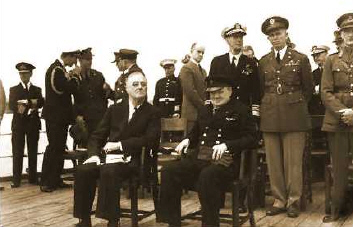 | While Congress voted on the draft extension,
Roosevelt and Churchill met
secretly aboard a warship off the coast of Newfoundland. Churchill had come hoping for a military
commitment from the United States . Instead, he settled for a declaration of principles called the
Atlantic Charter. In this document, the two leaders spelled out the causes for which World War II was
fought-even before the United States officially entered the conflict. | | |
The charter pledged both Great Britain and the United
States to (1) seek no territorial expansion, (2) pursue no territorial changes without the consent of
the inhabitants, (3) respect the right of people to choose their own form of government, (4) promote
free trade among nations, (5) encourage international cooperation to improve peoples' lives, (6)
build a secure peace based on freedom from want and fear, (7) work for disarmament of aggressors, and
(8) establish a "permanent system of general security."
Later in 1941, the Atlantic Charter became the basis of
a new document called "A Declaration by the United Nations." The term "United
Nations" was suggested by Roosevelt to express the common purpose of the Allies, those nations
that had joined together to fight the Axis powers. The declaration was signed by 26 nations,
including the Soviet Union and China. Together, observed Churchill, these nations represented
"four-fifths of the human race ."
|
|
|
94.
|
What was the Atlantic
Charter?
a. | A declaration of the common
principles of the U.S. and Britain | c. | A declaration of war on Germany and Japan | b. | A declaration of war of the nations of the world against
the Axis powers | d. | A secret agreement between the U.S.
and England that the U.S. would begin military action against
Germany |
|
|
|
95.
|
What was the Declaration of the
United Nations?
a. | A declaration of war by the nations
of the world against Germany | c. | A declaration of war of the United Nations against Germany and
Japan | b. | The nations of the world that opposed the Axis powers adopted the principles
of the Atlantic Charter. | d. | An offer of peace by the nations of
the world to the Axis powers. |
|
|
|
THE SHOOTING
BEGINS
"How near is
the United States to war?" That was the question Churchill asked after his August 1941 meeting
with Roosevelt. For the moment, the answer still seemed to be "not very." Then, on
September 4, a German U-boat fired two torpedoes at the U.S. destroyer Greer. President Roosevelt
responded with the announcement that the U.S. Navy had been ordered to fire on German ships on sight.
"When you see a rattlesnake poised to strike," the president explained, "you do not
wait until he has struck before you crush him. These Nazi submarines and raiders are the rattlesnakes of the Atlantic
."
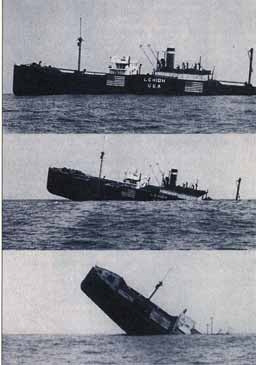 | Two weeks later, the Pink Star,
an American merchant ship, was sunk off Greenland. Its lost cargo included machine tools, evaporated
milk, and enough cheddar cheese to feed more than 3 .5 million British laborers for a week. In
mid-October, the U.S . destroyer Kearny was torpedoed near Iceland and 11 lives were lost.
"America has been
attacked," Roosevelt announced grimly. "The shooting has started . And history has
recorded who fired the first shot." A few days later, German U-boats sank the U.S . destroyer
Reuben James in the same waters, killing at least 100 sailors.
As the death toll mounted, the
Senate finally repealed the ban against arming merchant ships. The vote was so close, however, that
Roosevelt knew that something far more dramatic than German attacks on U.S. ships would be needed to
persuade Congress to declare war. Churchill knew this as well, advising his impatient war cabinet to
"have patience and trust to the tide which is flowing our way, and to
events." | | |
|
|
|
96.
|
Why did the German U boats
attack American cargo ships and destroyers?
a. | The Germans attacked American ships
by mistake | c. | American ships
were helping to supply England who was at war with Germany | b. | The Germans did not like
Americans | d. | The Germans wanted to hijack the
supplies being sent to Europe for their own use |
|
|
|
97.
|
Which statement is
true?
a. | Roosevelt was convinced that he
could negotiate with the Axis power to bring peace to Europe and Asia | c. | Roosevelt wanted war with the Axis while the isolationists
wanted America to become allies of the Axis | b. | Roosevelt and the isolationists were in agreement on what
America should do about the Axis aggression | d. | Roosevelt was convinced that the U.S. needed to go to war with the Axis but
couldn’t act because of the isolationists in
Congress |
|
|
|
98.
|
Who was the leader of Great
Britain in the Summer of 1941?
a. | Franklin
Roosevelt | c. | Winston
Churchill | b. | Neville Chamberlain | d. | Sir Reinem James |
|
|
|
Japan Attacks the United
States
The tide pushing the
United States toward war was flowing much faster than either leader knew. To almost everyone's
surprise, however, the attack that brought the United States into the war came from an unexpected
country-not from Germany but from Japan.
JAPAN'S AMBITIONS
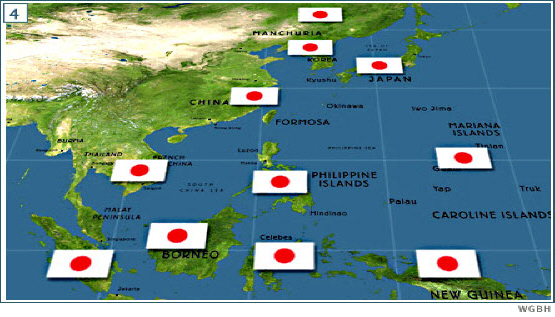
In Japan, expansionists
had long dreamed of creating a vast colonial empire that would stretch from Manchuria and China south
to Thailand and Indonesia . This dream had motivated Japan's invasion of Manchuria in 1931
and of China in 1937 . South of China, though, Japan's ambitions for expansion brought them into
conflict with other colonial powers . These powers included France (in French Indochina), the
Netherlands (in the Dutch East Indies), Britain (in Burma, India, and Malaya), and the United States
(in Guam and the Philippines) . By 1941, France and the Netherlands had fallen to Germany, and the
British were too busy fighting Hitler to block Japanese expansion . Only the United States and its
Pacific islands remained in Japan's way.
The Japanese began their southward push in
July of 1941 by taking over French military bases in Indochina (now Vietnam, Cambodia, and Laos) .
The United States protested this new act of aggression by cutting off trade with Japan. The
embargoed goods included the one thing Japan could not live without-oil to fuel its war machine .
Japanese military leaders warned that, without oil, Japan could be defeated without its enemies ever
striking a blow. The leaders declared that Japan must either persuade the United States to end its
oil embargo or seize the oil fields in the Dutch East Indies .
|
|
|
99.
|
What was the source of tensions
between the United States and Japan in 1941?
a. | Japanese exports to the United
States | c. | Japan’s refusal to buy oil
from the United States | b. | Japan’s desire to conquer and control Asia by
force. | d. | American aggression in
China |
|
|
|
100.
|
Which statement is
true?
a. | Japan attacked China even though
China did nothing to provoke Japan | c. | Japan attacked China because it was an ally of the United
States | b. | China attacked Japan causing the Japanese
invasion | d. | The U.S. was responsible for
Japanese aggression in Asia |
|
|
|
|
In October, the militant Japanese general
Hideki Tojo became the new
prime minister of Japan. Shortly after taking office, Tojo met Japan's revered emperor, Hirohito
. At that meeting, Tojo promised the emperor that the government would make a final attempt to
preserve peace with the Americans. If the peace talks failed, Japan would have no choice but to go to
war. But on November 5, 1941, the very day that Tojo's special "peace" envoy flew
to Washington for talks, the prime minister ordered the Japanese navy to prepare for an attack on the
United States. This demonstrates that neither Tojo or Hirohito was interested in peace with the
United states.
| | |
The U.S.
military had broken Japan's secret communication codes and knew that Japan was preparing for a
strike. What it didn't know was where the attack would come. Late in November, Roosevelt
sent out a "war warning" to military commanders in Hawaii, Guam, and the Philippines . If
war could not be avoided, the warning said, "the United States desires that Japan commit the
first overt act." And the nation waited.
The peace talks went on for a month. Then, late
on December 6, 1941, the president received a decoded message that had been intercepted. This message
instructed Japan's peace envoy to reject all American peace proposals . "This means
war," Roosevelt told his friend and adviser Harry Hopkins . "It's too bad we
can't strike first and prevent a surprise," Hopkins replied . "No, we can't do
that," Roosevelt reportedly responded. "We are a democracy of peaceful people . We have a
good record . We must stand on it."
|
|
|
101.
|
How did we know that Japan was
preparing for war with the U.S. and would not accept our peace offers?
a. | The Japanese emperor was controlled
by the military leaders | c. | We were informed
by the German ambassador | b. | We broke the Japanese codes and could listen to their
communications | d. | Japan told the U.S. that it wanted
war and would attack soon |
|
|
|
102.
|
Who was the Japanese military
general who became prime minister in 1941?
a. | General
Hiroheto | c. | Hideki
Tojo | b. | A military leader cannot be a civilian
leader | d. | General Hideki
Godzilla |
|
|
|
103.
|
What did changes in the
Japanese government in October 1941 mean?
a. | Japan would probably become a more
peaceful nation | c. | The military was
out of favor with the Japanese government | b. | The military was now in control of the Japanese
government | d. | There would be restrictions and
controls placed on the Japanese military |
|
|
|
104.
|
Which statement is
true?
a. | Roosevelt knew Japan was going to
attack the U.S. but didn’t know when and where | c. | Roosevelt had no idea that Japan was going to attack the
U.S. | b. | Roosevelt knew that Japan was going to attack Pearl Harbor on December
7 | d. | Roosevelt wanted to attack Japan first and that is what
prompted the Japanese attack |
|
|
|
THE ATTACK ON PEARL
HARBOR
Early the next
morning, a Japanese dive-bomber swooped low over the U.S. naval base at Pearl Harbor the largest U.S
. naval base in the Pacific. The bomber was followed by more than 180 Japanese warplanes launched
from six aircraft carriers. As the first Japanese bombs found their targets, a radio operator flashed
this message: "Air raid on Pearl Harbor. This is not a drill." For an hour and
a half, the Japanese planes were barely disturbed by American antiaircraft guns and blasted target
after target . By the time the last plane soared off around 9:30 A.M ., the devastation was
appalling. John Garcia, a pipe fitter's apprentice, was there.
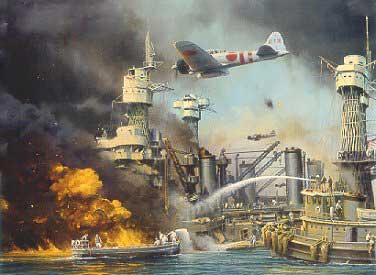 |
For Japan, the attack on Pearl Harbor was a stunning
victory. The Japanese navy all but
crippled the entire U.S. Pacific Fleet in one blow. Its own casualties numbered only 29 planes . In
Tokyo, the elated Tojo visited a shrine to thank the spirits of his ancestors for this favorable
opening of Japan's campaign to rule East Asia.
| | |
In
Washington, the mood ranged from outrage to panic. At the White House, Eleanor Roosevelt watched
closely as her husband, with a "deadly calm," absorbed the news from Hawaii, "each
report more terrible than the last." The surprise raid had sunk or badly damaged 18 ships .
About 350 planes had been destroyed or severely damaged. Some 2,400 people had died, and another
1,178 had been wounded. These losses constituted more damage than the U.S . Navy had suffered in all
of World War I .
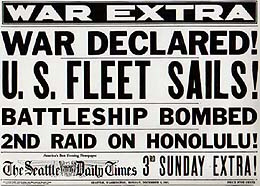 | Beneath the president's
calm, Eleanor could see how worried he was. "I never wanted to have to fight this war on two
fronts," Roosevelt told his wife. "We haven't the Navy to fight in both the Atlantic
and the Pacific . . . so we will have to build up the Navy and the Air Force and that will mean that
we will have to take a good many defeats before we can have a victory." The next day, President
Roosevelt addressed Congress. He asked for a declaration of war against Japan, which Congress
quickly approved. Three days later,
Germany and Italy declared war on the United States | | |
For all the damage done at Pearl Harbor, perhaps the greatest was to the
cause of isolationism. "The only thing now to do," said the isolationist senator Burton
Wheeler after the attack, "is to lick (kick) the hell out of them."
|
|
|
105.
|
What was the response of
President Roosevelt to the attack on Pearl Harbor by the Japanese?
a. | Asked Japan for a peace
treaty | c. | He did
nothing | b. | Asked Congress for a declaration of war against Japan the next
day. | d. | Asked Congress for a declaration of war against Japan and
Germany the next day. |
|
|
|
106.
|
Which statement is
true?
a. | The attack on Pearl Harbor was a big
victory for Japan | c. | The attack on
Pearl Harbor was a victory for Hitler | b. | The attack on Pearl Harbor was a big loss for
Japan | d. | The Japanese army led the attack on Pearl
Harbor |
|
|
|
107.
|
After the attack on Pearl
Harbor by Japan, and the declaration of war against the U.S. by Germany, Roosevelt knew America would
have to fight a two front war
in Asia and Europe. How did FDR feel about fighting a two front war?
a. | He was confident that it would be a
short war | c. | He wanted to ask
Germany for peace so he could concentrate on Japan | b. | He was concerned and thought it would take a long time to
defeat Germany and Japan | d. | He was happy that America would
finally be able to show it’s strenght |
|
|
|
108.
|
Which is not true of Joseph
Stalin?
a. | totalitarian | c. | Launched massive drive to collectivize
agriculture | b. | Communist | d. | entered into a pact or alliance with Germany in
1936 |
|
|
|
109.
|
Which does not match Benito
Mussolini
a. | fascist | c. | launched invasion of
Ethiopia | b. | nationalist | d. | supported government ownership of
property |
|
|
|
110.
|
Which does not match Adolf
Hitler
a. | nationalist | c. | supported Treaty of Versailles | b. | was elected to office | d. | militaristic expansionism |
|
|
|
111.
|
Which does not match
japan's militarists
a. | expansionists | c. | forced Japan to become China's ally | b. | launched an invasion of
Manchuria | d. | came to power through acts of
aggression |
|
|
|
112.
|
Which does not match Francisco
Franco
a. | Spanish | c. | totalitarionist | b. | Socialist | d. | aided by Hitler and Mussolini |
|
|
|
113.
|
Which nation won the Battle of
Britain?
a. | England | c. | Germany | b. | France | d. | Poland |
|
|
|
114.
|
This British prime minister
signed the Munich Pact
a. | Charles de
Gaulle | c. | Neville
Chamberlain | b. | Winston Churchill | d. | Sir Richard Burton |
|
|
|
115.
|
After the fall of France, he
set up a government in exile in Britain.
a. | Charles de
Gaulle | c. | Neville
Chamberlain | b. | Winston Churchill | d. | Candide |
|
|
|
116.
|
The result of this led Hitler
to call off the invasion of Britain indefinitely.
a. | Non-aggression
pact | c. | D
Day | b. | Battle of Britain | d. | Dunkirk |
|
|
|
117.
|
This German military strategy
of "lightning war" was first used in Poland.
a. | Luftwaffe | c. | Calvary charge | b. | Liebenstram | d. | blitzkrieg |
|
|
|
118.
|
This nation was the first
country to be invaded and taken over by Germany.
a. | France | c. | Austria | b. | Britain | d. | Poland |
|
|
|
119.
|
Prior to the invasion of
Poland, this is what Germany and the Soviet Union agreed to.
a. | nonaggression
pact | c. | foreign
aid | b. | NATO | d. | Warsaw
Pact |
|
|
|
120.
|
This nation ceased to exist
after it was divided between Germany and the Soviet Union.
a. | Austria | c. | Poland | b. | France | d. | Britain |
|
|
|
121.
|
This country invaded Denmark,
Norway, the Netherlands, Belgium, and Luxembourg.
a. | Germany | c. | Italy | b. | Japan | d. | Soviet Union |
|
|
|
122.
|
By signing the Munich Pact,
Britain and France agreed to take this policy toward German Aggression
a. | aggression | c. | "walk softly and carry a big
stick" | b. | appeasement | d. | state of war |
|
|
|
123.
|
About the Munich Pact, he said,
"Britain and France had to choose between war and dishonor. they chose dishonor. they will have
war."
a. | Neville
Chamberlain | c. | Winston
Churchill | b. | Charles de Gaulle | d. | Joseph Stalin |
|
|
|
124.
|
The terms of surrender forced
on this nation included, German occupation of the northern part of the country and the establishment
of a Nazi-controlled puppet government in the southern part.
a. | Austria | c. | Poland | b. | France | d. | Norway |
|
|
|
125.
|
Congress passes the _____,
which permits nations to buy American armaments as long as they pay cash and carry the goods home in
their own ships.
a. | Neutrality Act of
1939 | c. | Lend Lease
Act | b. | Atlantic Charter | d. | the Trade Embargo Act |
|
|
|
126.
|
The _____ (Germany, Italy and
Japan) form an alliance.
a. | Central
powers | c. | Axis
powers | b. | United Nations Charter | d. | Allies |
|
|
|
127.
|
Congress boosts defense
spending and creates the first peacetime _____ in U.S. history.
a. | trade
embargo | c. | draft | b. | declaration of war | d. | charter |
|
|
|
128.
|
The _____ passes, allowing the
president to lend or lease arms and other supplies to "any country whose defense was vital to
the United States."
a. | Lend-Lease
Act | c. | Trade Embargo
Act | b. | Neutrality Act | d. | Smoot Hawley Act |
|
|
|
129.
|
Germany invades _____ in spite
of the peace treaty signed between the two nations just prior to the invasion of
Poland.
a. | China | c. | France | b. | Austria | d. | the Soviet Union |
|
|
|
130.
|
Japan takes over French
military bases in Indochina. In response, the United States places a _____ on
Japan.
a. | blockade | c. | cultural exchange prohibition | b. | trade embargo | d. | fine |
|
|
|
131.
|
Churchill and Roosevelt meet
secretly aboard a warship off the coast of Newfoundland. Together, they draft the _____.
a. | Atlantic
Charter | c. | Rio Pact
| b. | U.N.
Charter | d. | NATO
alliance |
|
|
|
132.
|
Hideki Tojo becomes prime
minister of _____ .
a. | China | c. | the Philippines | b. | Viet Nam | d. | Japan |
|
|
|
133.
|
Japan launches a surprise
attack on the naval base at
a. | Long
Beach | c. | Pearl
Harbor | b. | Formosa | d. | Yokuska |
|
|
|
134.
|
the United States declares war
on _____ .
a. | Germany | c. | the Soviet Union | b. | Japan | d. | the Warsaw Pact |
|
|
|
135.
|
Germany and Italy declare war
on _____ .
a. | Japan | c. | Sicily | b. | China | d. | the United States |
|
|
|
136.
|
What did the Nuremberg laws
do?
a. | declare war on
Poland | c. | restricted civil rights for
Jews | b. | established the German draft | d. | guaranteed a new car for every
German |
|
|
|
137.
|
What happened during
Kristallnacht?
a. | Santa Claus came to
Germany | c. | The German
universities burned all non-German books. | b. | The Grinch stole Germany's
Christmas | d. | Persecution of Jews and breaking of
glass in Jewish owned businesses. |
|
|
|
138.
|
All of the following were
leaders of totalitarian governments except ...
a. | Joseph
Stalin | c. | Benito
Mussolini | b. | Francisco Franco | d. | Neville Chamberlain |
|
|
|
139.
|
At the end of World War I, Many
new democracies were established in Europe. In the years between the two world wars, most of these
democracies ...
a. | thrived | c. | Were torn apart by civil
wars | b. | became Communist | d. | were replaced by dictatorships |
|
|
|
140.
|
Where was the first Fascist
government formed?
a. | Italy | c. | Spain | b. | Japan | d. | Germany |
|
|
|
141.
|
Joseph Stalin and Adolf Hitler
shared similar attitudes toward all of the following except ...
a. | nationalism | c. | centralized government | b. | ownership of property | d. | militaristic expansionism |
|
|
|
142.
|
Which of the following did
Adolf Hitler oppose?
a. | Kristallnacht | c. | the Nuremberg Laws | b. | the Munich Pact | d. | the Treaty of Versailles |
|
|
|
143.
|
Britain and France were drawn
into war with Germany because ...
a. | Hitler had taken power in
Germany | c. | Germany had
attacked Czechoslovakia | b. | they had promised military aid to Poland | d. | Germany had pulled out of the League of
Nations |
|
|
|
144.
|
Which nation(s) signed a
nonagression pact with Germany that led to the invasion and division of Poland.
a. | Italy | c. | Italy and Japan | b. | Spain | d. | the Soviet Union |
|
|
|
145.
|
The Battle of Britain forced
Germany to ....
a. | join the Axis
powers | c. | put off the invasion of
Britain | b. | fight a three-front war | d. | enter into a nonaggression pack with
Britain. |
|
|
|
146.
|
The Nazis practiced genocide,
which is the ...
a. | acting out of anti-Semitic
beliefs | c. | terrorizing of the
citizens of a nation by a government | b. | deliberate extermination of specific group of
people | d. | killing of people for the express purpose of creating
terror. |
|
|
|
147.
|
The German blitzkrieg was a
military strategy that depended on ...
a. | a system of
fortifications | c. | surprise and
overwhelming force | b. | "out-waiting" an opponent | d. | the ability to make a long steady
advance. |
|
|
|
148.
|
Britain and France adopted a
policy of appeasement toward Germany ...
a. | before the war
began | c. | when the U.S. declared
war | b. | when they declared war | d. | after France was invaded and
divided |
|
|
|
149.
|
the United States entered WWII
as a direct result of ...
a. | the attack on Pearl
Harbor | c. | the invasion and division of
Italy | b. | the invasion and division of France | d. | attacks on U.S. ships in the
Atlantic |
|
|
|
150.
|
Who or what did President
Roosevelt describe as "the rattlesnakes of the Atlantic?"
a. | Axis nations and their
leaders | c. | German U-boats and
their crews | b. | U.S. Navy ships and their crews | d. | Japanese warplanes and their
pilots |
|
Matching
|
|
|
a. | fascism
| l. | Winston Churchill
| b. | appeasement | m. | totalitarian | c. | Holocaust | n. | Charles de Gaulle | d. | Joseph Stalin | o. | Neutrality Acts | e. | blitzkrieg | p. | Kristallnacht | f. | Adolf Hitler | q. | Benito Mussolini | g. | concentration camp | r. | Axis powers | h. | Neville Chamberlain | s. | nonaggression pact | i. | genocide | t. | Nazism | j. | Lend-Lease Act | u. | Atlantic Charter | k. | Hideki Tojo | v. | Allies |
|
|
|
151.
|
Laws passed by Congress to ban
the sale of arms or loans to nations at war
|
|
|
152.
|
Agreement between Germany and
Russia not to fight each other
|
|
|
153.
|
Name given the night of
November 9, 1938, when Nazis in Germany attacked Jews, their businesses, and their
synagogues
|
|
|
154.
|
Communist dictator of the Soviet
Union
|
|
|
155.
|
Head of the French government
in exile in England
|
|
|
156.
|
British and American statement
of goals for fighting World War II
|
|
|
157.
|
Government that has complete
control over its citizens and puts down all opposition
|
|
|
158.
|
Germany, Italy, and
Japan
|
|
|
159.
|
Fascist political philosophy
of Germany under Nazi dictator Hitler
|
|
|
160.
|
Group of nations, including
the United States, Britain, and the Soviet Union, who opposed the Axis powers
|
|
|
161.
|
Nazi dictator of
Germany
|
|
|
162.
|
Prime minister of Japan during
World War II
|
|
|
163.
|
Prime minister of Great
Britain before World War II. Signed non-aggression pact with Hitler and came home saying,
“Peace in our time.”
|
|
|
164.
|
Deliberate and systematic
killing of an entire people
|
|
|
165.
|
Lightning war strategy used by
Germany against Poland
|
|
|
166.
|
Prison camps operated by the
Nazis where Jews and others were starved while doing slave labor or murdered
|
|
|
167.
|
Political system based on a
strong, centralized government headed by a dictator
|
|
|
168.
|
Trying to pacify an aggressor
in order to keep the peace
|
|
|
169.
|
Law that allowed lending or
leasing arms to any nation “whose defense was vital to the United
States”
|
|
|
170.
|
Fascist dictator of
Italy
|
|
|
171.
|
Prime minister of Great
Britain during World War II. Warned England about the dangers of Hitler.
|
|
|
172.
|
Systematic murder of 11
million Jews and other people in Europe by the Nazis
|